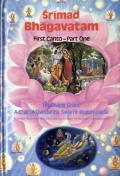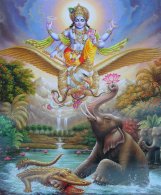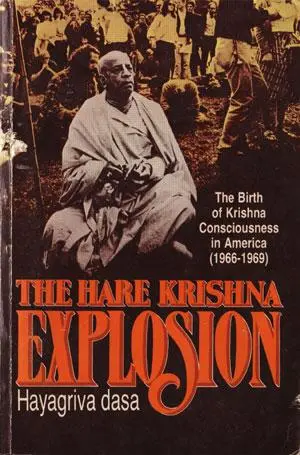Śrī Īśopaniṣad The knowledge that brings one nearer to the Supreme Personality of Godhead, Krishna
The following are all eighteen mantras and the invocation from Śrī Īśopaniṣad from the original first edition, which was first published by ISKCON Books in 1969. For those of you who like to recite and memorize important slokas, we have compiled this list of the mantras along with the Roman transliteration, and English equivalents. You can click on the ‘print icon’ at bottom of post to print out the entire collection, and you can click on link at bottom for a free pdf download of entire book along with original Sanskrit Text and full Purports by His Divine Grace A.C. Bhaktivedanta Swami Prabhupada.
Śrī Īśopaniṣad Mantras
by His Divine Grace A. C. Bhaktivedanta Swami Prabhupāda
INVOCATION
oṁ pūrṇam adaḥ pūrṇam idaṁ
pūrṇāt pūrṇam udacyate
pūrṇasya pūrṇam ādāya
pūrṇam evāvaśiṣyate
oṁ—the Complete Whole; pūrṇam—perfectly complete; adaḥ—that; pūrṇam—perfectly complete; idam—this phenomenal world; pūrṇāt—from the all-perfect; pūrṇam—complete unit; udacyate—is produced; pūrṇasya—of the Complete Whole; pūrṇam—completely, all; ādāya—having been taken away; pūrṇam—the complete balance; eva—even; avaśiṣyate—is remaining.
The Personality of Godhead is perfect and complete. And because He is completely perfect, all emanations from Him, such as this phenomenal world, are perfectly equipped as a complete whole. Whatever is produced of the Complete Whole is also complete by itself. And because He is the Complete Whole, even though so many complete units emanate from Him, He remains the complete balance.
Mantra One
īśāvāsyam idam sarvaṁ
yat kiñca jagatyāṁ jagat
tena tyaktena bhuñjīthā
mā gṛdhaḥ kasya svid dhanam
īśa—by the Lord; āvāsyam—controlled; idam—this; sarvam—all; yat kiñca—whatever; jagatyām—within the universe; jagat—all that is animate or inanimate; tena—by Him; tyaktena—set-apart quota; bhuñjīthāḥ—you should accept; mā—do not; gṛdhaḥ—endeavor to gain; kasya svit—of anyone else; dhanam—the wealth.
Everything animate or inanimate that is within the universe is controlled and owned by the Lord. One should therefore accept only those things necessary for himself, which are set aside as his quota, and one must not accept other things, knowing well to Whom they belong.
Mantra Two
kurvann eveha karmāṇi
jijīviṣec chataṁ samāḥ
evaṁ tvayi nānyatheto ’sti
na karma lipyate nare
kurvan—doing continuously; eva—thus; iha—during this span of life; karmāṇi—work; jijīviṣet—one should desire to live; śatam—one hundred; samāḥ—years; evam—so living; tvayi—unto you; na—no; anyathā—alternative; itaḥ—from this path; asti—there is; na—not; karma—work; lipyate—can be bound; nare—unto a man.
One may aspire to live for hundreds of years if he continuously goes on working in that way, because that sort of work will not bind him to the law of karma. And there is no alternative to this way for man.
Mantra Three
asuryā nāma te lokā
andhena tamasāvṛtāḥ
tāṁs te pretyābhigacchanti
ye ke cātma-hano janāḥ
asuryāḥ—meant for the asuras; nāma—famous by the name; te—those; lokāḥ—planets; andhena—by ignorance; tamasā—by darkness; āvṛtāḥ—covered; tān—those planets; te—they; pretya—after death; abhigacchanti—enter into; ye—anyone; ke—everyone; ca—and; ātma-hanaḥ—the killers of the soul; janāḥ—persons.
The killer of the soul, whoever he may be, must enter into the planets known as the worlds of the faithless, full of darkness and ignorance.
Mantra Four
anejad ekaṁ manaso javīyo
nainad devā āpnuvan pūrvam arṣat
tad dhāvato ’nyān atyeti tiṣṭhat
tasminn apo mātariśvā dadhāti
anejat—fixed; ekam—one; manasaḥ—than the mind; javīyaḥ—more swift; na—not; enat—this Supreme Lord; devāḥ—the demigods like Indra, etc.; āpnuvan—can approach; pūrvam—in front; arṣat—moving quickly; tat—He; dhāvataḥ—those who are running; anyān—others; atyeti—surpasses; tiṣṭhat—remaining in one place; tasmin—in Him; apaḥ—rain; mātariśvā—the gods who control the wind and rain; dadhāti—supply.
The Personality of Godhead, although fixed in His Abode, is more swift than the mind, and can overcome all others running. The powerful demigods cannot approach Him. Although in one place, He has control over those who supply the air and rain. He surpasses all in excellence.
Mantra Five
tad ejati tan naijati
tad dūre tad v antike
tad antar asya sarvasya
tad u sarvasyāsya bāhyataḥ
tat—this Supreme Lord; ejati—walks; tat—He; na—not; ejati—walks; tat—He; dūre—far away; tat—He; u—also; antike—very near; tat—He; antaḥ—within; asya—of this; sarvasya—of all; tat—He; u—also; sarvasya—of all; asya—of this; bāhyataḥ—external to.
The Supreme Lord walks and does not walk. He is far away, but He is very near as well. He is within everything, and again He is outside of everything.
Mantra Six
yas tu sarvāṇi bhūtāny
ātmany evānupaśyati
sarva-bhūteṣu cātmānaṁ
tato na vijugupsate
yaḥ—he who; tu—but; sarvāṇi—all; bhūtāni—living entities; ātmani—in relation to the Supreme Lord; eva—only; anupaśyati—observes in a systematic way; sarva-bhūteṣu—in every living being; ca—and; ātmānam—the Supersoul; tataḥ—thereafter; na—not; vijugupsate—hates anyone.
A person who sees everything in relation to the Supreme Lord, and sees all entities as His parts and parcels, and who sees the Supreme Lord within everything, never hates anything, nor any being.
Mantra Seven
yasmin sarvāṇi bhūtāny
ātmaivābhūd vijānataḥ
tatra ko mohaḥ kaḥ śoka
ekatvam anupaśyataḥ
yasmin—in the situation; sarvāṇi—all; bhūtāni—living entities; ātmā—the cit-kaṇa, or spiritual spark; eva—only; abhūt—exist as; vijānataḥ—of one who knows; tatra—therein; kaḥ—what; mohaḥ—illusion; kaḥ—what; śokaḥ—anxiety; ekatvam—oneness in quality; anupaśyataḥ—of one who sees through authority, or one who sees constantly like that.
One who always sees all living entities as spiritual sparks, in quality one with the Lord, becomes a true knower of things. What is there as illusion or anxiety for him?
Mantra Eight
sa paryagāc chukram akāyam avraṇam
asnāviram śuddham apāpa-viddham
kavir manīṣī paribhūḥ svayambhūr
yāthātathyato ’rthān vyadadhāc chāśvatībhyaḥ samābhyaḥ
saḥ—that person; paryagāt—must know in fact; śukram—the omnipotent; akāyam—unembodied; avraṇam—without reproach; asnāviram—without veins; śuddham—antiseptic; apāpa-viddham—prophylactic; kaviḥ—omniscient; manīṣī—philosopher; paribhūḥ—the greatest of all; svayambhūḥ—self-sufficient; yāthātathyataḥ—just in pursuance of; arthān—desirables; vyadadhāt—awards; śāśvatībhyaḥ—immemorial; samābhyaḥ—time.
Such a person must know in fact the Greatest of all, Who is unembodied, omniscient, beyond reproach, without veins, pure and uncontaminate, the selfsufficient Philosopher Who is awarding everyone’s desire since time immemorial.
Mantra Nine
andhaṁ tamaḥ praviśanti
ye ’vidyām upāsate
tato bhūya iva te tamo
ya u vidyāyām ratāḥ
andham—gross ignorance; tamaḥ—darkness; praviśanti—enter into; ye—those who; avidyām—nescience; upāsate—worship; tataḥ—than that; bhūyaḥ—still more; iva—like; te—they; tamaḥ—darkness; ye—those who; u—also; vidyāyām—in the culture of knowledge; ratāḥ—engaged.
Those who are engaged in the culture of nescient activities shall enter into the darkest region of ignorance. Worse still are those engaged in the so-called culture of knowledge.
Mantra Ten
anyad evāhur vidyayā-
nyad āhur avidyayā
iti śuśruma dhīrāṇāṁ
ye nas tad vicacakṣire
anyat—different; eva—certainly; āhuḥ—said; vid-yayā—by culture of knowledge; anyat—different; āhuḥ—said; avidyayā—by culture of nescience; iti—thus; śuśruma—I heard; dhīrāṇām—from the sober; ye—who; naḥ—to us; tat—that; vicacakṣire—explained.
The wise have explained to us that one result is derived from the culture of knowledge, and it is said that a different result is obtained from the culture of nescience.
Mantra Eleven
vidyāṁ cāvidyāṁ ca yas
tad vedobhayaṁ saha
avidyayā mṛtyuṁ tīrtvā
vidyayāmṛtam aśnute
vidyām—knowledge in fact; ca—and; avidyām—nescience; ca—and; yaḥ—a person who; tat—that; veda—knows; ubhayam—both; saha—simultaneously; avidyayā—by culture of nescience; mṛtyum—repeated death; tīrtvā—transcending; vidyayā—by culture of knowledge; amṛtam—deathlessness; aśnute—enjoys.
Only one who can learn the process of nescience and that of transcendental knowledge side by side can tran- scend the influence of repeated birth and death, and enjoy the full blessings of immortality.
Mantra Twelve
andhaṁ tamaḥ praviśanti
ye ’sambhūtim upāsate
tato bhūya iva te tamo
ya u sambhūtyām ratāḥ
andham—ignorance; tamaḥ—darkness; praviśanti—enter into; ye—those who; asambhūtim—demigods; upāsate—worship; tataḥ—than that; bhūyaḥ—still more; iva—like that; te—those; tamaḥ—darkness; ye—who; u—also; sambhūtyām—in the Absolute; ratāḥ—engaged.
Those who are engaged in the worship of demigods enter into the darkest region of ignorance, and still more so do the worshipers of the Absolute.
Mantra Thirteen
anyad evāhuḥ sambhavād
anyad āhur asambhavāt
iti śuśruma dhīrāṇāṁ
ye nas tad vicacakṣire
anyat—different; eva—certainly; āhuḥ—it is said; sambhavāt—by worshiping the Supreme Lord, the cause of all causes; anyat—different; āhuḥ—it is said; asambhavāt—by worshiping what is not the Supreme; iti—thus; śuśruma—I heard it; dhīrāṇām—from the undisturbed authorities; ye—who; naḥ—unto us; tat—about that subject matter; vicacakṣire—perfectly explained.
It is said that one result is obtained by worshiping the Supreme Cause of all causes, and that another is obtained by worshiping what is not supreme. All this was heard from the undisturbed authorities who clearly explained it.
Mantra Fourteen
sambhūtiṁ ca vināśaṁ ca
yas tad vedobhayaṁ saha
vināśena mṛtyuṁ tīrtvā
sambhūtyāmṛtam aśnute
sambhūtim—the eternal Personality of Godhead, His transcendental name, form, pastimes, qualities and paraphernalia, the variegatedness of His abode, etc.; ca—and; vināśam—the temporary material manifestation of demigods, men, animals, etc., with their false names, fame, etc.; ca—also; yaḥ—one who; tat—that; veda—knows; ubhayam—both; saha—along with; vināśena—with everything liable to be vanquished; mṛtyum—death; tīrtvā—surpassing; sam-bhūtyā—in the eternal kingdom of God; amṛtam—deathlessness; aśnute—enjoys.
One should know perfectly well about the Personality of Godhead and His transcendental Name, as well as the temporary material creation with its temporary demigods, men and animals. When one knows these, he surpasses death, and the ephemeral cosmic manifestation with it, and in the eternal Kingdom of God he enjoys his eternal life of bliss and knowledge.
Mantra Fifteen
hiraṇmayena pātreṇa
satyasyāpihitaṁ mukham
tat tvaṁ pūṣann apāvṛṇu
satya-dharmāya dṛṣṭaye
hiraṇmayena—by a golden effulgence; pātreṇa—by a dazzling covering; satyasya—of the Supreme Truth; apihitam—covered; mukham—the face; tat—that covering; tvam—Yourself; pūṣan—O sustainer; apāvṛṇu—kindly remove; satya—pure; dharmāya—unto the devotee; dṛṣṭaye—for exhibiting.
O my Lord, Sustainer of all that lives, Your real face is covered by Your dazzling effulgence. Kindly remove that covering and exhibit Yourself to Your pure devotee.
Mantra Sixteen
pūṣann ekarṣe yama sūrya prājāpatya
vyūha raśmīn samūha
tejo yat te rūpaṁ kalyāṇa-tamaṁ
tat te paśyāmi yo ’sāv asau puruṣaḥ so ’ham asmi
pūṣan—O maintainer; eka-ṛṣe—the primeval philosopher; yama—the regulating principle; sūrya—the destination of the sūris (great devotees); prājāpatya—the well-wisher of the prajāpatis (progenitors of mankind); vyūha—kindly remove; raśmīn—the rays; samūha—kindly withdraw; tejaḥ—effulgence; yat—so that; te—Your; rūpam—form; kalyāṇa-tamam—most auspicious; tat—that; te—Your; paśyāmi—I may see; yaḥ—one who is; asau—like the sun; asau—that; puruṣaḥ—Personality of Godhead; saḥ—myself; aham—I; asmi—am.
O my Lord, O primeval Philosopher, Maintainer of the universe, O regulating Principle, Destination of the pure devotees, Well-wisher of the progenitors of mankind, please remove the effulgence of Your transcendental rays, so that I can see Your Form of Bliss. You are the eternal Supreme Personality of Godhead, like unto the Sun, as I am.
Mantra Seventeen
vāyur anilam amṛtam
athedaṁ bhasmāntaṁ śarīram
oṁ krato smara kṛtaṁ smara
krato smara kṛtaṁ smara
vāyuḥ—air of life; anilam—total reservoir of air; amṛtam—indestructible; atha—now; idam—this; bhasmāntam—after being turned to ashes; śarīram—body; oṁ—O Lord; krato—O enjoyer of all sacrifices; smara—please remember; kṛtam—all that has been done by me; smara—please remember; krato—O supreme beneficiary; smara—please remember; kṛtam—all that I have done for You; smara—please remember.
Let this temporary body be burnt into ashes, and let the air of life be merged with the totality of air. Now, O my Lord, please remember all my sacrifices, and because You are the ultimate Beneficiary, please remember all that I have done for You.
Mantra Eighteen
agne naya supathā rāye asmān
viśvāni deva vayunāni vidvān
yuyodhy asmaj juhurāṇam eno
bhūyiṣṭhāṁ te nama-uktiṁ vidhema
agne—O my Lord, as powerful as fire; naya—kindly lead; supathā—by the right path; rāye—for reaching You; asmān—us; viśvāni—all; deva—O my Lord; vayunāni—actions; vidvān—the knower; yuyodhi—kindly remove; asmat—from us; juhurāṇam—all hindrances on the path; enaḥ—all vices; bhūyiṣṭhām—most numerous; te—unto You; namaḥ uktim—words of obeisance; vidhema—I do.
O my Lord, powerful as the fire, Omnipotent One, now I do offer You all obeisances, falling at Your Feet on the ground. O my Lord, please lead me on the right path to reach You, and, as You know all of what I have done in the past, please make me free from the reactions to my past sins, so that there will be no hindrance to my progress.
For a Free pdf Download of Entire Original 1969 Śrī Īśopaniṣad with full Sanskrit text, and Purports click on Sri-Isopanisad-original-1969-edition
Thanks to Prahlada-Nrishma at Krishna Path for making the free download available
Also if you would like to purchase the book or a case of books please visit The Hare Krishna Movement















Aug 07, 2013 @ 20:08:55
Like it or not, an evil person who gives himself to Krsna will be given salvation; even if he is unable to commit to “Vedic Injunction”. His fate becomes Krsna and He is saved by The Lord Yah, who’s Grace cannot be matched.